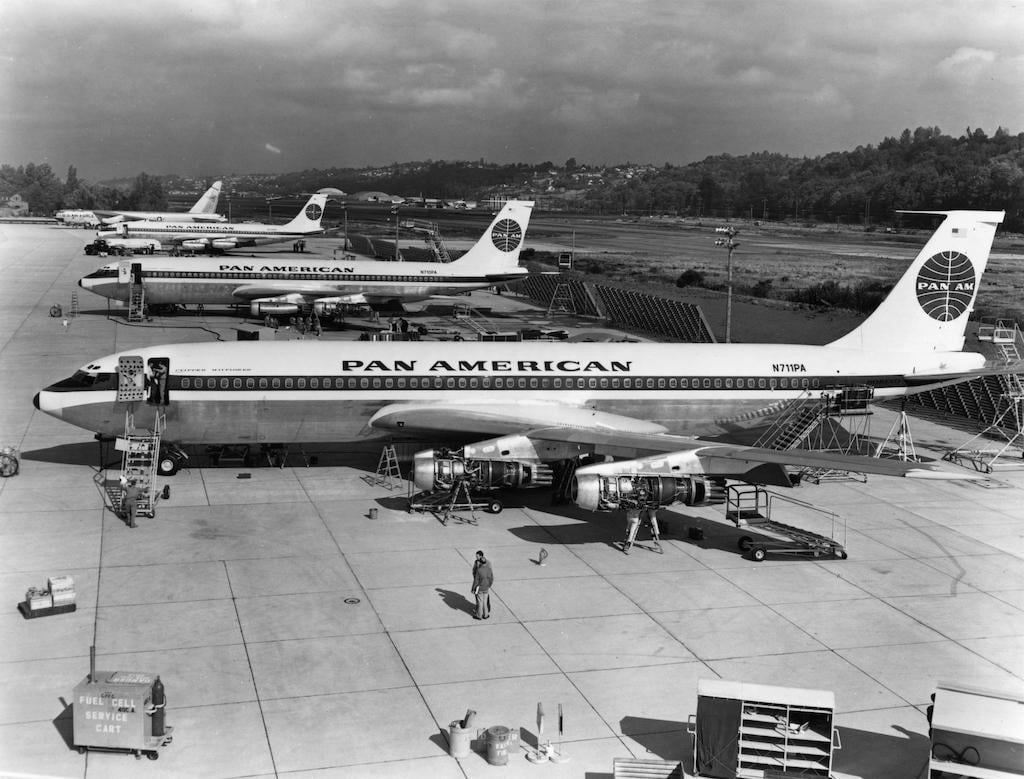
There are very few pilots left flying from the days before cockpit resource management, but those of us from that era have some horror stories to tell. If you don’t have access to one of us dinosaurs, I highly recommend Robert Gandt’s excellent book, Skygods: The Fall of Pan Am. It is perhaps the best book ever written about CRM.
I grew up in Hawaii and used to marvel at those wonderful Pan American World Airways Boeing 707s flying up Pearl Harbor Channel at a few hundred feet, turning right at what seemed to be the last possible moment to alight onto the runway with a view of Diamond Head to the east. Little did I know just how terrifying this could be. Gandt writes about one such approach from this time. Capt. Lou Cogliani was a pilot from Pan Am’s heyday of flying seaplanes. He was, what Pan Am founder Juan Trippe liked to call, a “Master of Ocean Flying Boats.”
Cogliani hated flying with new hires and when forced to do so, put on a master class of how not to run a crew. On this particular flight, he was paired with a brand-new copilot who was doing his best to be a competent crewmember. Cogliani ignored the new hire’s warning about being too high on the approach and was forced to fly a circle to lose altitude. He then overshot the final approach course. He finally got vectored for a straight-in. The copilot kept quiet until he could bear it no longer. At 600 ft. the copilot said, “Do you want the landing gear down, captain?”
Cogliani swore at his first officer. “Landing gear? I’ll tell you when I want the landing gear.” Two and a half seconds later, with a great deal of authority he told him, “Gear down!”
Three days later, in the chief pilot’s office, the first officer was taught how things were to be. He was told, “You will sit there and raise and lower the captain’s landing gear on command, and keep your impertinent, newly hired mouth shut.”
Over the years, I’ve flown with more than a few pilots of Cogliani’s mindset. Thankfully not recently. But the mindset does exist even today. Here are a few of my favorite answers from Skygods that I have flown with.
Me: “We should check the stall barrier system as called for by the checklist.”
Skygod: “I don’t plan on stalling the aircraft.”
Me: “We need to make a Unicom call at this non-towered airport.”
Skygod: “I’m flying a jet; they can get out of my way.”
Me: “You shouldn’t be doing paperwork while I’m taxiing.”
Skygod: “I trust you not to hit anything.”
Me: “We will be landing below minimum fuel; we need to divert.”
Skygod: “The minimums are for lesser pilots. We are fine.”
In each case I suspected the Skygod in question was at some point a disciplined professional but had later lost his way. I have wondered a few times if I was susceptible to this disease.
Reining in Unchecked Egos and ‘The Disease of Me’
If you are looking for an expert when it comes to dealing with unchecked egos, you need not go any further than Pat Riley, a former player and coach in the National Basketball Association. He was named the NBA Coach of the Year three times and has won multiple championships for the Los Angeles Lakers and the Miami Heat. He says that great teams follow a trajectory he calls the “Innocent Climb.” Before a team wins it is innocent; the team members watch out for each other and work toward a collective goal. But after success arrives, individuals begin to calculate their own worth against the team’s, and egos appear. This led to the fall of the Lakers after two consecutive championships in 1987 and 1988. Riley said it was a case of “The disease of me leads to the defeat of us.”
How do you prevent the disease of me? English football coach Tony Adams sums it this way: Play for the name on the front of the jersey and people will remember the name on the back. There is a corollary in all this for us pilots.
Why are you a pilot? If your reason is to go down in history as a legendary pioneer or to break a speed, altitude or endurance record, then I can’t help you. Men and women with this motivation exist and I believe they were necessary in aviation’s dawning era. But no more. If your motivation is to continuously improve your knowledge and skills as you operate your aircraft safely, we can talk.
As I mentioned, we Air Force pilots have titanium-reinforced egos that can be both bulletproof and fragile at the same time. I’ve noticed that there is often an inverse relationship between outsized egos and abilities. The best pilots tend to be the humblest. But it is the pilots with the biggest egos that get the press. The best advice I can give you comes from the greatest fighter pilot of them all, Col. John Boyd. He had a talk that he gave to his acolytes. (Yes, he was so legendary that he had acolytes.) If you want to learn more about him, I highly recommend my favorite biography of all time: Boyd: The Fighter Pilot Who Changed the Art of War, by Robert Coram. It is worth quoting directly:
“Tiger, one day you will come to a fork in the road,” Boyd said. “And you’re going to have to make a decision about which direction you want to go.” Using his hands to illustrate, Boyd marked off these two directions. “If you go that way you can be somebody. You will have to make compromises and you will have to turn your back on your friends. But you will be a member of the club and will get promoted and you will get good assignments.” Then Boyd paused to make the alternative clear. “Or,” he said, “you can go that way and do something--something for your country and for your Air Force and for yourself. If you decide you want to do something, you may not get promoted and you may not get the good assignments and you certainly will not be a favorite of your superiors. But you won’t have to compromise yourself. You will be true to your friends and to yourself. And your work might make a difference. To be somebody or to do something.” He concluded with the words that guided many since: “To be or to do? Which way will you go?”
And that is the key to preventing your ego from consuming your inner principles, keeping you true to the foundations of crew resource management and to always ensure that you put a priority on staying safe. I think the database at the NTSB is filled with reports of pilots who wanted to be somebody. They were the pilots who were too good for Standard Operating Procedures and checklists. They didn’t care about doing the things that make pilots professional. In the end they succeeded in being remembered. I shall always remember them as the pilots with unchecked egos. And they will inspire me to do better.
Editor's note: The first part of this two-part series is "Unchecked Ego In The Cockpit."






Comments
As an instructor in the USAF I was quick to note this as well in student pilots. During debriefs the good student would be able to tell me where they had missed the mark and often they reason why this had occurred. The poor student simply thought that the training sortie had gone well. They seemed to be either incapable of recognizing how far below standard their performance actually was or, for reasons of ego, refused to acknowledge the same to themselves and their instructor.
A good pilot knows that they perfect flight has never been flown. But that doesn't stop them from trying.